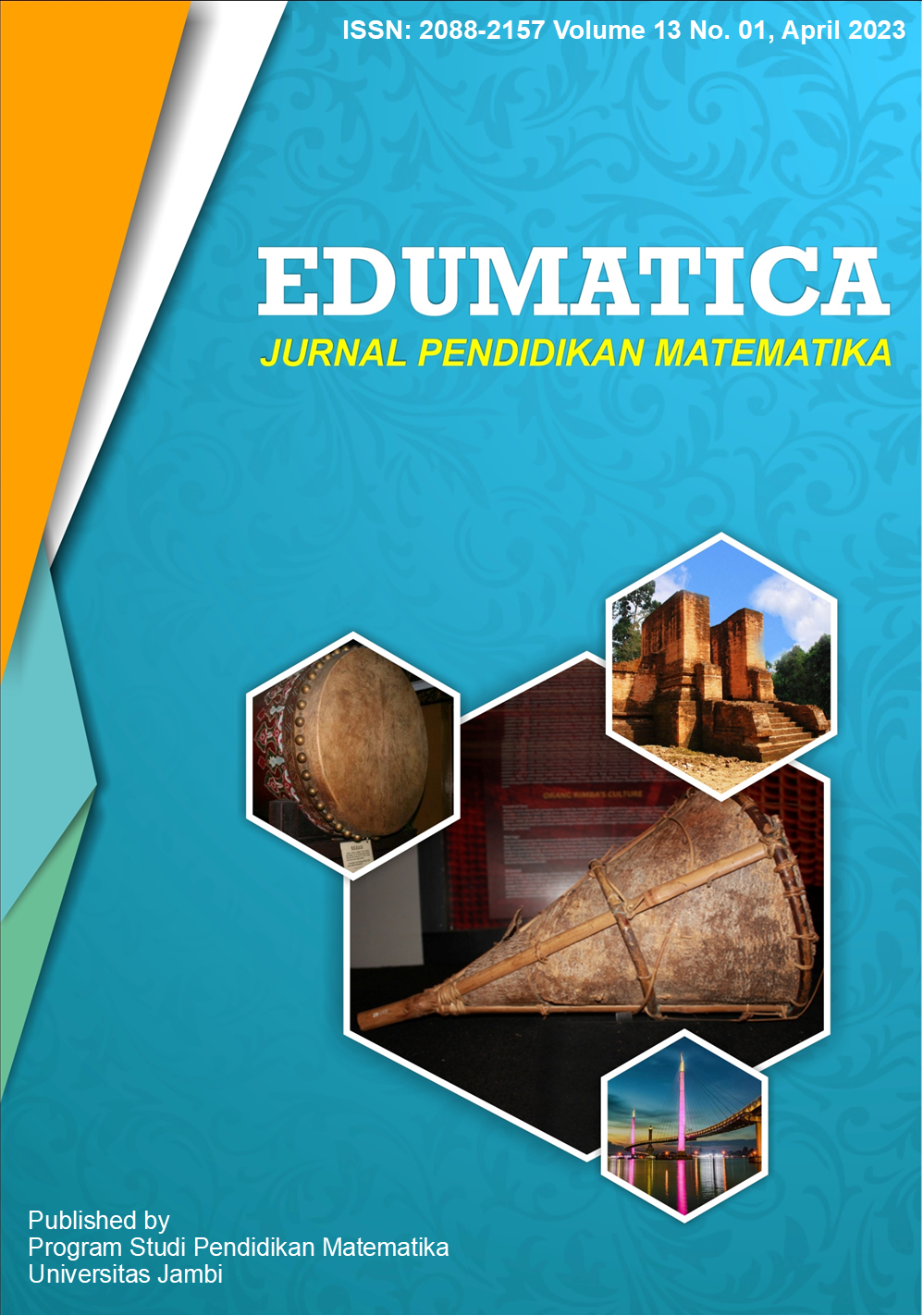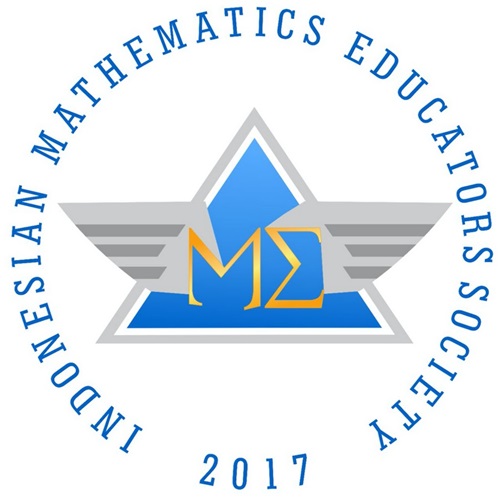Analysis of Student Learning Barriers in Fractional Multiplication: A Hermeneutics Phenomenology Study in Higher Education
DOI:
https://doi.org/10.22437/edumatica.v13i01.24190Keywords:
epistemological obstacle, hermeneutics phenomenology, multip, ontogeAbstract
Multiplication of fractions is one of the operations on fractions that tends to be easy, but it becomes a problem for students. Only a little previous research has examined the multiplication of fractions and the factors that cause this problem at the tertiary level. This study aims to describe the factors that cause problems in terms of the types of learning barriers that students experience. The research design is hermeneutics phenomenology. The participants in this study were 15 students aged 18-25 years, 7 boys and 8 girls, 9 students majoring in natural sciences during high school, and 6 students from social studies majors. The researcher is the main instrument, with a fraction multiplication test consisting of 2 questions developed by NCTM and a semi-structured interview guide as an additional instrument. Data is processed using NVivo-12-assisted thematic analysis to simplify the coding process. The study revealed that students experienced more learning difficulties when working on non-routine fraction multiplication problems. For routine problems, students experience learning difficulties with the type of ontogenic obstacle that is psychological (not careful). For non-routine problems, students experience learning barriers with epistemological types because they rarely work on word problems, as well as ontogenic obstacles that are conceptual and psychological.
Downloads
References
Aebi, M. F., & Linde, A. (2015). The Epistemological Obstacles in Comparative Criminology: A Special Issue Introduction. European Journal of Criminology, 12(4), 381–385. https://doi.org/10.1177/1477370815595311
Aksoy, N. C., & Yazlik, D. O. (2017). Student Errors in Fractions and Possible Causes of These Errors. Journal of Education and Training Studies, 5(11), 219–233. https://doi.org/10.11114/jets.v5i11.2679
Alhojailan, M. I., & Ibrahim, M. (2012). Thematic Analysis: A Critical Review of Its Process and Evaluation. West East Journal of Social Sciences, 1(2011), 8–21. https://faculty.ksu.edu.sa/sites/default/files/ta_thematic_analysis_dr_mohammed_alhojailan.pdf
Baylor, A. L., Shen, E., & Warren, D. (1999). Supporting Learners with Hating Mathematics: The Impact of System Pedagogical Agent of Emotional and Motivational Support. Pedagogical Agent, 1997.
Bharaj, P. K., Jacobson, E., Liu, J., & Ahmad, F. (2021). Assessing Students’ Understanding of Fraction Multiplication. Mathematics Education Across Cultures: Proceedings of the 42nd Meeting of the North American Chapter of the International Group for the Psychology of Mathematics Education, 265–269. https://doi.org/10.51272/pmena.42.2020-27
Bolstad, O. H. (2019). Teaching for Mathematical Literacy: School Leaders’ and Teachers’ Rationales. European Journal of Science and Mathematics Education, 7(3), 93–108. https://doi.org/10.30935/scimath/9537
Brousseau, G. (2002). Theory of Didactical Situations in Mathematics. Kluwer Academic Publishers. https://id1lib.org/book/979725/fd6fae
Chen, C.-H., Chiu, C.-H., Lin, C.-P., & Wu, S.-T. (2013). Presenting Solution Strategies of Fraction Multiplication and Division on Mathematics Instructional Websites. World Journal on Educational Technology, 5(53), 431–444. https://doi.org/https://www.academia.edu/35535476/Presenting_solution_strategies_of_fraction_multiplication_and_division_on_mathematics_instructional_websites
Cohen, G. L., & Sherman, D. K. (2014). The Psychology of Change: Self-affirmation and Social Psychological Intervention. In Annual Review of Psychology (Vol. 65, pp. 333–371). Annual Reviews Inc. https://doi.org/10.1146/annurev-psych-010213-115137
Critcher, C. R., & Dunning, D. (2015). Self-affirmations Provide a Broader Perspective on Self-threat. Personality and Social Psychology Bulletin, 41(1), 3–18. https://doi.org/10.1177/0146167214554956
Dalkin, S., Forster, N., Hodgson, P., Lhussier, M., & Car, S. M. (2020). Using Computer Assisted Qualitative Data Analysis Software (CAQDAS; NVivo) to Assist in the Complex Process of Realist Theory Generation, Refinement and Testing. International Journal of Social Research Methodology, 24(1), 123–134. https://doi.org/10.1080/13645579.2020.1803528
Daut Siagian, M., Suryadi, D., Nurlaelah, E., & Prabawanto, S. (2022). Investigation of Secondary Students’ Epistemological Obstacles in the Inequality Concept. Mathematics Teaching Research Journal, 14(4), 106–128. https://commons.hostos.cuny.edu/mtrj/wp-content/uploads/sites/30/2022/12/06-Siagian.pdf
Dooly, M., Moore, E., & Vallejo, C. (2017). Research Ethics. In E. Moore & M. Dooly (Eds.), Qualitative Approach to Research on Plurilingual Education (pp. 351–362). Research-publishing.net.
Ekawati, R., Imah, E. M., Amin, S. M., Kohar, A. W., Nisa’, K., & Prahmana, R. C. I. (2022). Error Analysis of Dyslexic Student’s Solution on Fraction Operation Tasks. Mathematics Teaching Research Journal, 14(1), 67–79. https://files.eric.ed.gov/fulltext/EJ1361650.pdf
Esposito, A. (2012). Research Ethics in Emerging Forms of Online Learning: Issues Arising from a Hypothetical Study on a MOOC. Electric Journal of E-Learning, 10(3), 315–325. https://files.eric.ed.gov/fulltext/EJ985433.pdf
Fauzi, I., & Suryadi, D. (2020). The Analysis of Students’ Learning Obstacles on the Fraction Addition Material for Five Graders of Elementary Schools. Al Ibtida: Jurnal Pendidikan Guru MI, 7(1), 33–45. https://doi.org/10.24235/al.ibtida.snj.v7i1.6020
Fehr, H. F. (1968). Fractions as operators. The Arithmetic Teacher, 15(3), 228–232. http://www.jstor.org/stable/41163165
Finkelstein, S., Sharma, U., & Furlonger, B. (2019). The Inclusive Practices of Classroom Teachers: A Scoping Review and Thematic Analysis. International Journal of Inclusive Education, 1–28. https://doi.org/10.1080/13603116.2019.1572232
Genc, M., & Erbas, A. K. (2019). Secondary Mathematics Teachers’ Conceptions of Mathematical Literacy. International Journal of Education in Mathematics, Science and Technology (IJEMST), 7(3), 222–237. https://www.ijemst.com/index.php/ijemst/article/view/611
Gulevska, V., & Atanasoska, T. (2015). Enhancing Teacher Competencies with Emotional and Ethical Capacity. International Journal of Cognitive Research in Science, Engineering and Education, 3(2), 85–90.
Heale, R., & Forbes, D. (2013). Understanding Triangulation in Research Understanding Triangulation in Research. Evid Based Nurs, 16(4), 98. https://doi.org/10.1136/eb-2013-101494
Ioannidou, F., & Konstantikaki, V. (2008). Empathy and Emotional Intelligence: What is It Really About? International Journal of Caring Sciences, 1(3), 118–123.
Isnawan, M. G. (2022). Desain Didaktis Pembelajaran Pecahan di SMP Negeri 1 Narmada Kabupaten Lombok Barat [Dissertation]. Universitas Pendidikan Indonesia.
Isnawan, M. G., Suryadi, D., & Turmudi, T. (2022). How Do Secondary Students Develop the Meaning of Fractions? A Hermeneutic Phenomenological Study. Beta: Jurnal, 15(1), 1–19. https://doi.org/10.20414/betajtm.v15i1.496
Iulia, & Gugoiu, T. (2006). The Book of Fractions. La Citadelle. https://la-citadelle.com/mathematics/the_book_of_fractions.pdf
Johar, R., & Lubis, K. R. (2018). The Analysis of Students’ Mathematical Representation Errors in Solving Word Problem Related to Graph. Jurnal Riset Pendidikan Matematika, 5(1), 96. https://doi.org/10.21831/jrpm.v5i1.17277
Julie, H. (2017). The Elementary School Teachers’ Ability in Adding and Subtracting Fraction, and Interpreting and Computing Multiplication and Division Fraction. International Journal of Science and Applied Science: Conference Series, 1(1), 55–63. https://doi.org/10.20961/ijsascs.v1i1.5114
Keshavarz, H. (2020). Hermeneutic Phenomenology in Supporting Research and Information Services: Contributions to Information Science. Journal of Information Science Theory and Practice, 8(4), 29–39. https://doi.org/https://doi.org/10.1633/JISTaP.2020.8.4.3
Maelasari, E., & Jupri, A. (2017). Analysis of Students Errors on Division of Fractions. Journal of Physics: Conference Series, 812, 1–5. https://doi.org/10.1088/1742-6596/755/1/011001
Makonye, J. P., & Khanyile, D. W. (2015). Probing grade 10 students about their mathematical errors on simplifying algebraic fractions. Research in Education, 94(1), 55–70. https://doi.org/10.7227/RIE.0022
Malone, A. S., & Fuchs, L. S. (2016). Error Patterns in Ordering Fractions Among At-Risk Fourth-Grade Students. Journal of Learning Disabilities, 1–16. https://doi.org/10.1177/0022219416629647
Moru, E. K. (2007). Talking with the Literature on Epistemological Obstacles. For the Learning Mathematics, 27(3), 34–37. https://flm-journal.org/Articles/7968B5B6DC68EB311866308086F062.pdf
NCTM. (2014). Principles to Actions: Ensuring Mathematical Success for All. NCTM. http://areaiihsmap.pbworks.com/w/file/fetch/109255672/Principles.To.Actions.ebook.pdf
Nowell, L. S., Norris, J. M., White, D. E., & Moules, N. J. (2017). Thematic Analysis: Striving to Meet the Trustworthiness Criteria. International Journal of Qualitative Methods, 16, 1–13. https://doi.org/10.1177/1609406917733847
Olsen, W. (2004). Triangulation in Social Research: Qualitative and Quantitative Methods Can Really Be Mixed. In M. Holborn (Ed.), Developments in Sociology (pp. 1–334). Causeway Press. https://doi.org/10.4324/9781315838120
Paulus, T., Woods, M., Atkins, D. P., & Macklin, R. (2015). The Discourse of QDAS: Reporting Practices of ATLAS.ti and NVivo Users with Implications for Best Practices. International Journal of Science Research Methodology, 20(1), 35–47. https://doi.org/10.1080/13645579.2015.1102454
Powell, S. R., Berry, K. A., & Benz, S. A. (2020). Analyzing the Word-Problem Performance and Strategies of Students Experiencing Mathematics Difficulty. Journal of Mathematical Behavior, 58, 1–16. https://doi.org/10.1016/j.jmathb.2020.100759
Purnamayanthi, K. T., Suparta, I. N., & Suweken, G. (2022). Analisis Tipe Kesalahan Siswa dalam Menyelesaikan Soal Matematika Berdasarkan Taksonomi Anderson. Edumatica: Jurnal Pendidikan Matematika, 12(1), 63–75. https://online-journal.unja.ac.id/edumatica/article/download/14747/13262
Purwanti, K. L. (2015). Pembelajaran Perkalian Pecahan Biasa Berbantu Media Benda Konkret: Studi Kasus Perbedaan Gender terhadap Kemampuan Matematika Siswa Kelas V SDN Sambiroto 3 Semarang. SAWWA, 10(2), 193–207. https://journal.walisongo.ac.id/index.php/sawwa/article/download/1431/1050
Ramezanzadeh, A., Adel, S. M. R., & Zareian, G. (2016). Teaching in Higher Education Authenticity in Teaching and Teachers’ Emotions: A Hermeneutic Phenomenological Study of the Classroom Reality. Teaching in Higher Education, 21(7), 807–824. https://doi.org/10.1080/13562517.2016.1183616
Reskina, & Kartini. (2022). Analisis Kesalahan Siswa dalam Menyelesaikan Soal Aritmetika Sosial Berdasarkan Teori Newman. Edumatica: Jurnal Pendidikan Matematika, 12(3), 238–248. https://online-journal.unja.ac.id/edumatica/article/view/19589/14974
Rifandi, R. (2017). Supporting Students’ Reasoning About Multiplication of Fractions by Constructing an Array Model. JRAMathEdu (Journal of Research and Advances in Mathematics Education), 1(2), 99–110. https://doi.org/10.23917/jramathedu.v1i2.3385
Rohmah, M., & Sutiarso, S. (2018). Analysis Problem Solving in Mathematical Using Theory Newman. Eurasia Journal of Mathematics, Science and Technology Education, 14(2), 671–681. https://doi.org/10.12973/ejmste/80630
Rohmah, S. K. (2019). Analisis Learning Obstacles Siswa pada Materi Pecahan Kelas IV Sekolah Dasar. Al-Aulad: Journal of Islamic Primary Education, 2(1), 13–24. https://doi.org/10.15575/al-aulad.v2i1.4428
Safriani, W., Munzir, S., Duskri, M., & Maulidi, I. (2019). Analysis of Students’ Errors on the Fraction Calculation Operations Problem. Al-Jabar: Jurnal Pendidikan Matematika, 10(2), 307–318. https://doi.org/10.24042/ajpm.v10i2.5224
Saygili, S. (2017). Examining the Problem Solving Skills and the Strategies Used by High School Students in Solving Non-Routine Problems. E-Uluslararası Eğitim Araştırmaları Dergisi, 8(2), 91–114. https://doi.org/10.19160/ijer.321075
Shanty, N. O., Hartono, Y., Putri, R. I. I., & De Haan, D. (2011). Design Research on Mathematics Education: Investigating the Progress of Indonesian Fifth Grade Students’ Learning on Multiplication of Fractions with Natural Numbers. Journal on Mathematics Education, 2(2), 147–162. https://doi.org/10.22342/jme.2.2.749.147-162
Shin, M., & Bryant, D. P. (2017). Improving the Fraction Word Problem Solving of Students with Mathematics Learning Disabilities: Interactive Computer Application. Remedial and Special Education, 38(2), 76–86. https://doi.org/10.1177/0741932516669052
Singh, P., Hoon, T. S., Nasir, N. A. M., Han, C. T., Rasid, S. M., & Hoong, J. B. Z. (2021). Obstacles Faced by Students in Making Sense of Fractions. The European Journal of Social & Behavioural Sciences, 30(1), 34–51. https://doi.org/10.15405/ejsbs.287
Son, J.-W., & Lee, J.-E. (2016). Pre-service Teachers’ Understanding of Fraction Multiplication, Representational Knowledge, and Computational Skills. Mathematics Teacher Education and Development, 18(2), 5–28. https://eric.ed.gov/?id=EJ1113959
Stephenson, H., Giles, D., & Bissaker, K. (2018). The Power of Hermeneutic Phenomenology in Restoring the Centrality of Experiences in Work-integrated Learning. International Journal of Work-Integrated Learning, 19(3), 261–271. https://files.eric.ed.gov/fulltext/EJ1196747.pdf
Suryadi, D. (2019a). Landasan Filosofis Penelitian Desain Didaktis (DDR). Pusat Pengembangan DDR Indonesia.
Suryadi, D. (2019b). Penelitian Desain Didaktis (DDR) dan Implementasinya. Gapura Press.
Tan, H., Wilson, A., & Olver, I. (2009). Ricoeur’s Theory of Interpretation: An Instrument for Data Interpretation in Hermeneutic Phenomenology. International Journal of Qualitative Methods, 8(4), 1–15. https://doi.org/10.1177%2F160940690900800401
Ulfa, N., Jupri, A., & Turmudi, T. (2021). Analisis Hambatan Belajar pada Materi Pecahan. Research and Development Journal of Education, 7(2), 226. https://doi.org/10.30998/rdje.v7i2.8509
Umbara, U., & Suryadi, D. (2019). Re-interpretation of Mathematical Literacy Based on the Teacher’s Perspective. International Journal of Instruction, 12(4), 789–806. https://doi.org/10.29333/iji.2019.12450a
Upu, A., Taneo, P. N. L., & Daniel, F. (2022). Analisis Kesalahan Siswa dalam Menyelesaikan Soal Cerita Berdasarkan Tahapan Newman dan Upaya Pemberian Scaffolding. Edumatica: Jurnal Pendidikan Matematika, 12(1), 52–62. https://online-journal.unja.ac.id/edumatica/article/view/16593/13261
Wilk, V., Soutar, G. N., & Harrigan, P. (2019). Tackling Social Media Data Analysis: Comparing and Contrasting QSR NVivo and Leximancer. Qualitative Market Research: An International Journal, 22(2), 94–113. https://doi.org/http://dx.doi.org/10.1108/QMR-01-2017-0021
Yulika, R., Rahman, U., & Sewang, A. M. (2019). The Effect of Emotional Intelligence and Learning Motivation on Student Achievement. South African Journal of Education, 39(1), 1–8. https://doi.org/10.2991/icamr-18.2019.94
Zhang, X., Clements, M. A. K., & Ellerton, N. F. (2014). Conceptual Mis(understandings) of Fractions: From Area Models to Multiple Embodiments. Mathematics Education Research Journal, 27(2), 233–261. https://doi.org/10.1007/s13394-014-0133-8
Downloads
Published
How to Cite
Issue
Section
License
Copyright (c) 2023 Muhamad Galang Isnawan, Naif Mastoor Alsulami, Muh. Rusmayadi, Samsuriadi Samsuriadi, Sudirman Sudirman, Wanda Nugroho Yanuarto

This work is licensed under a Creative Commons Attribution-NonCommercial-ShareAlike 4.0 International License.







